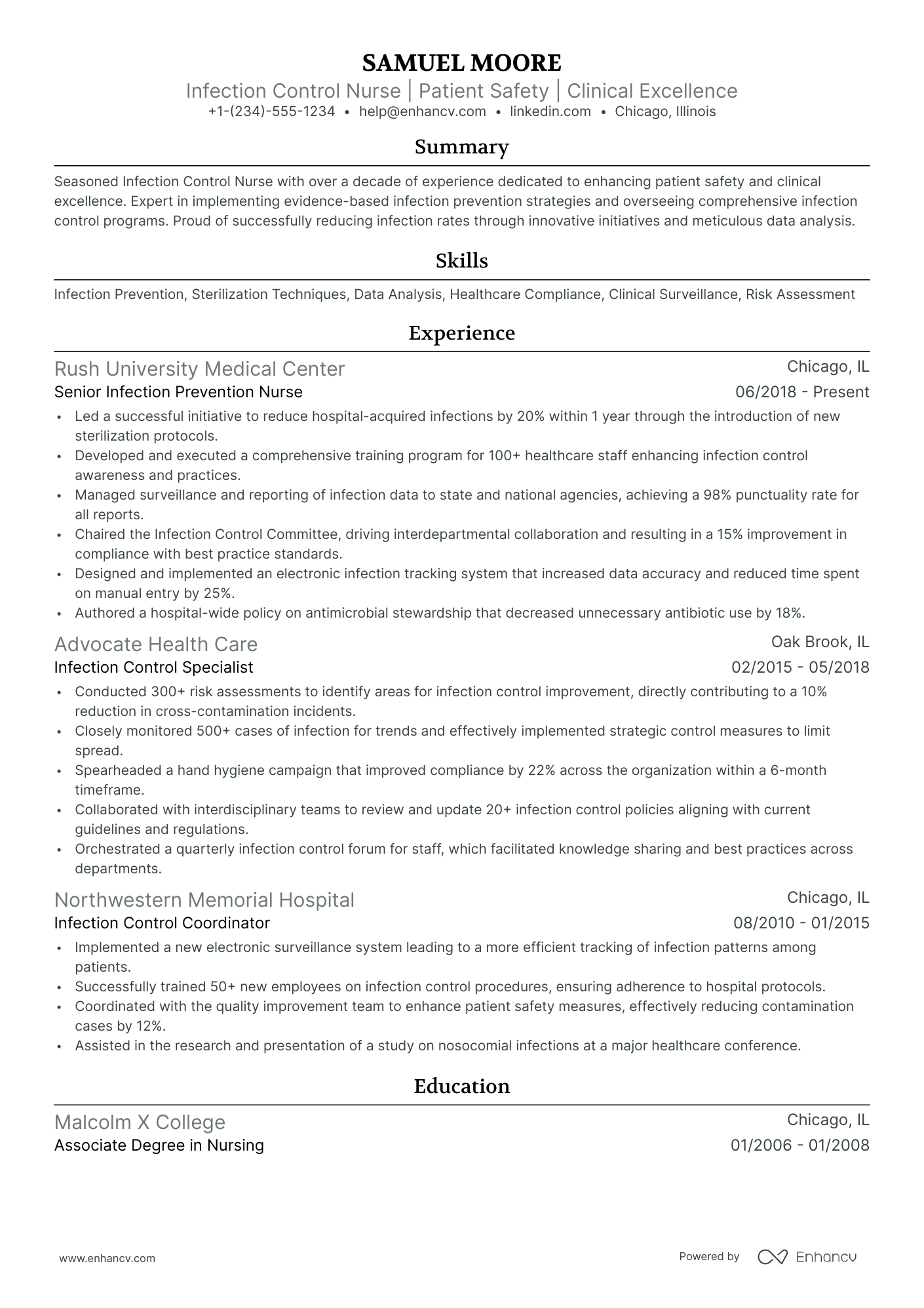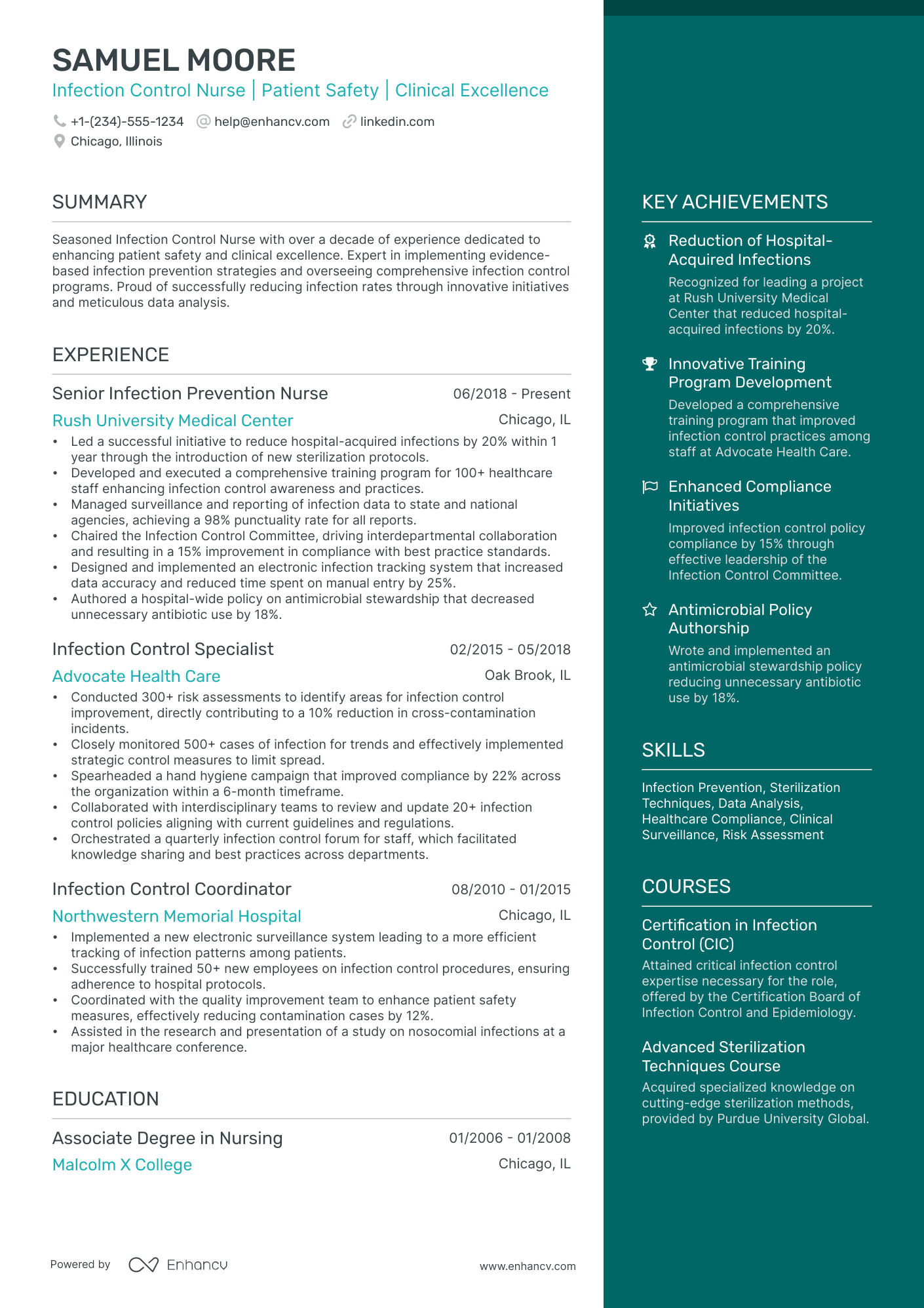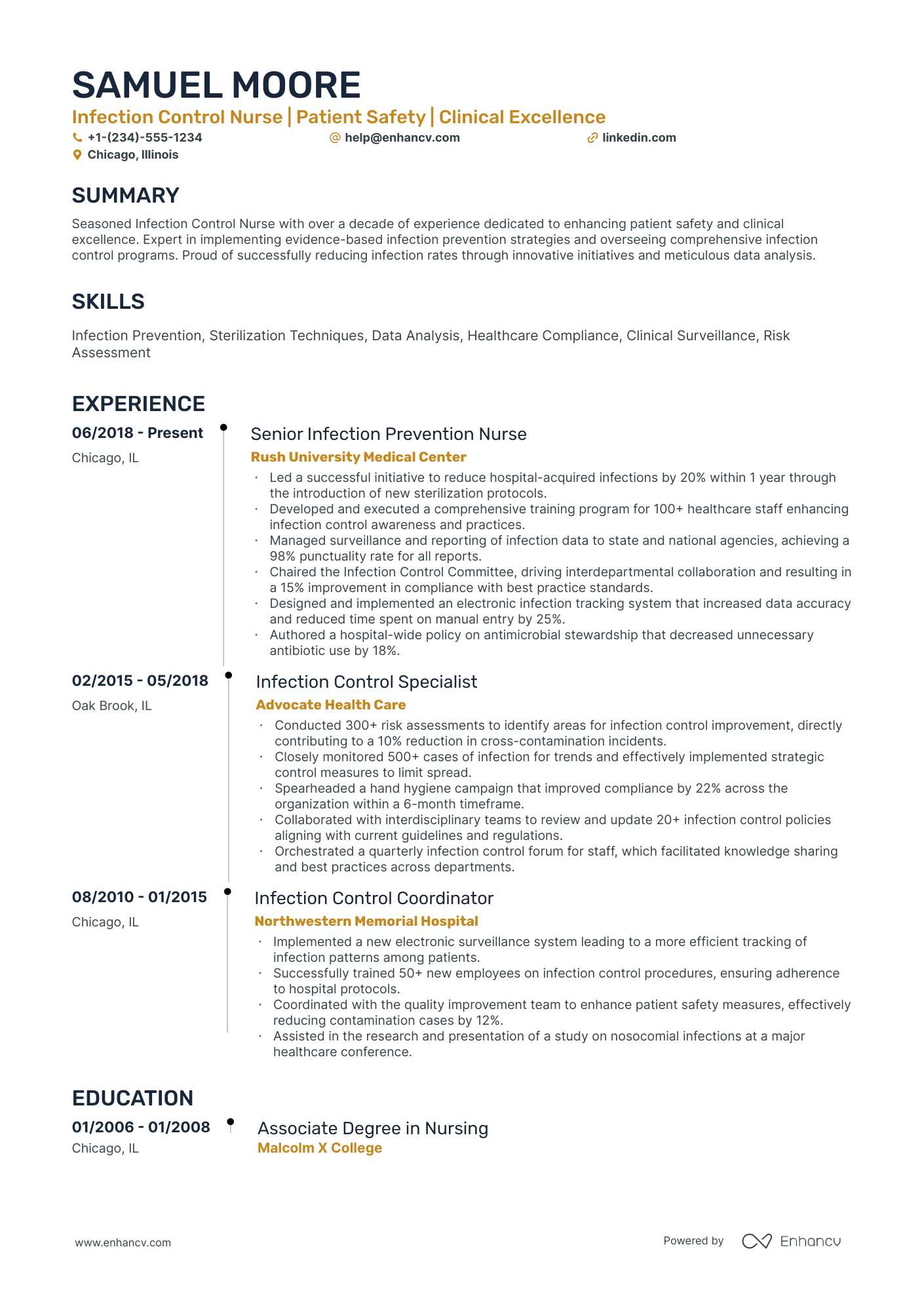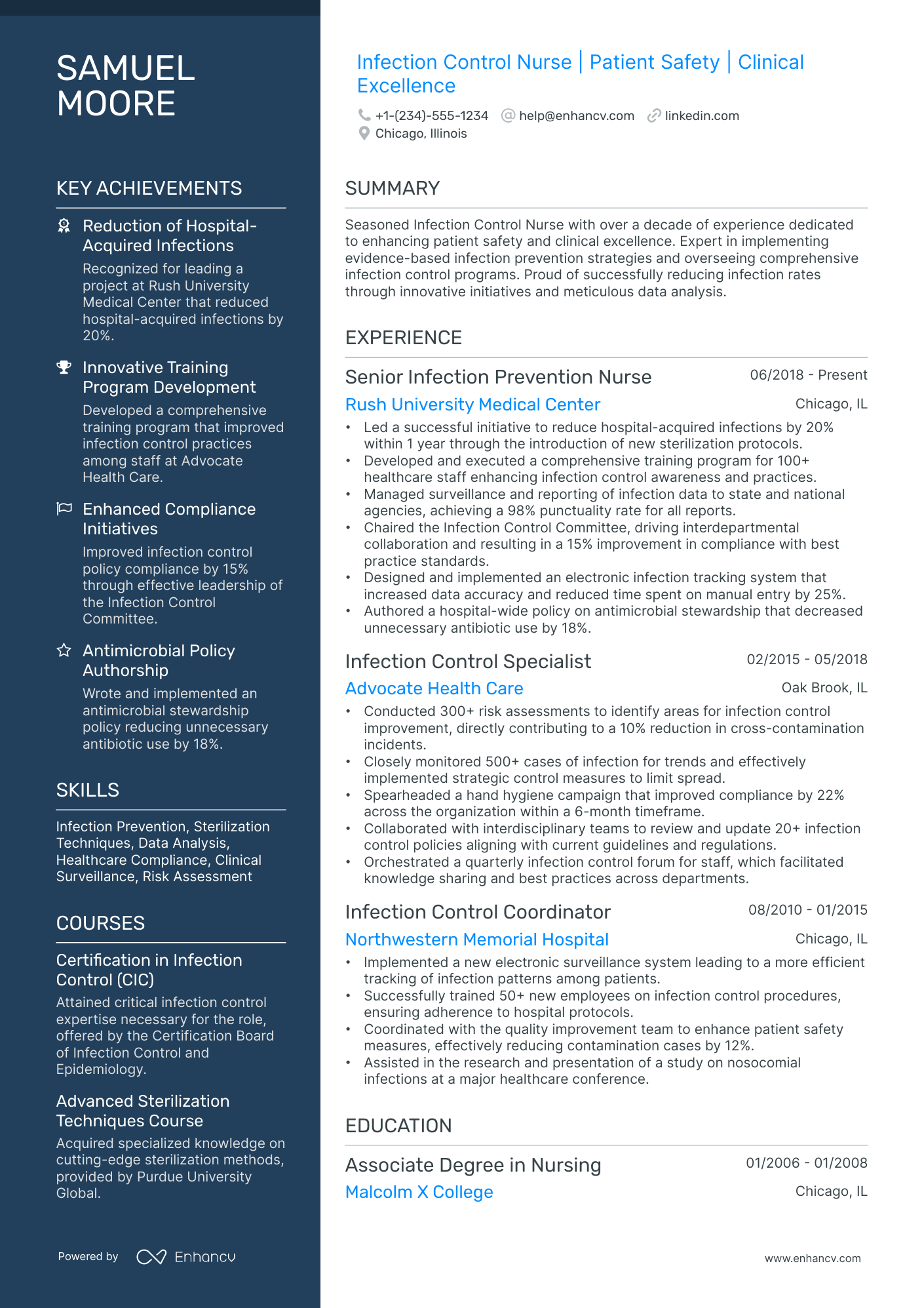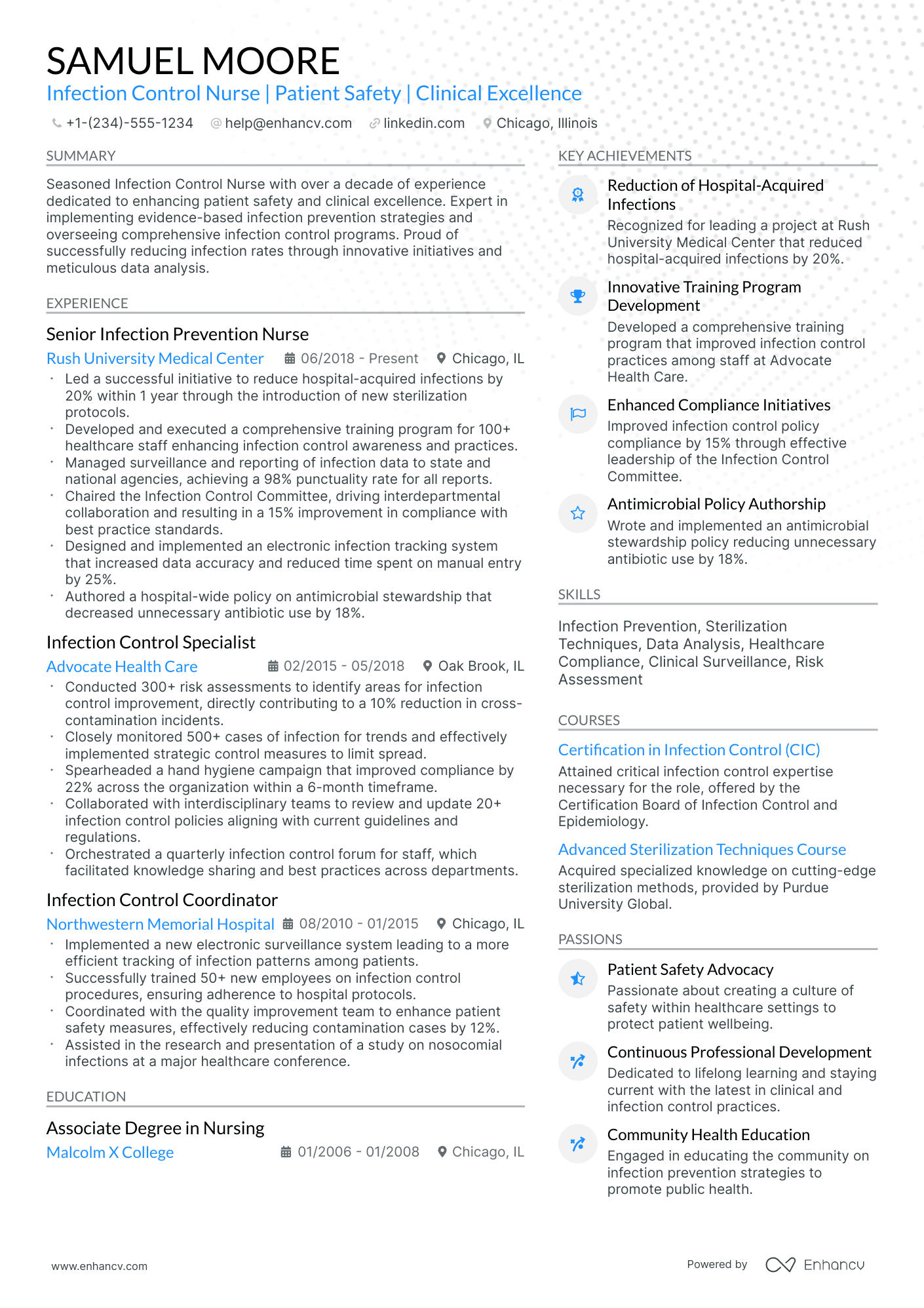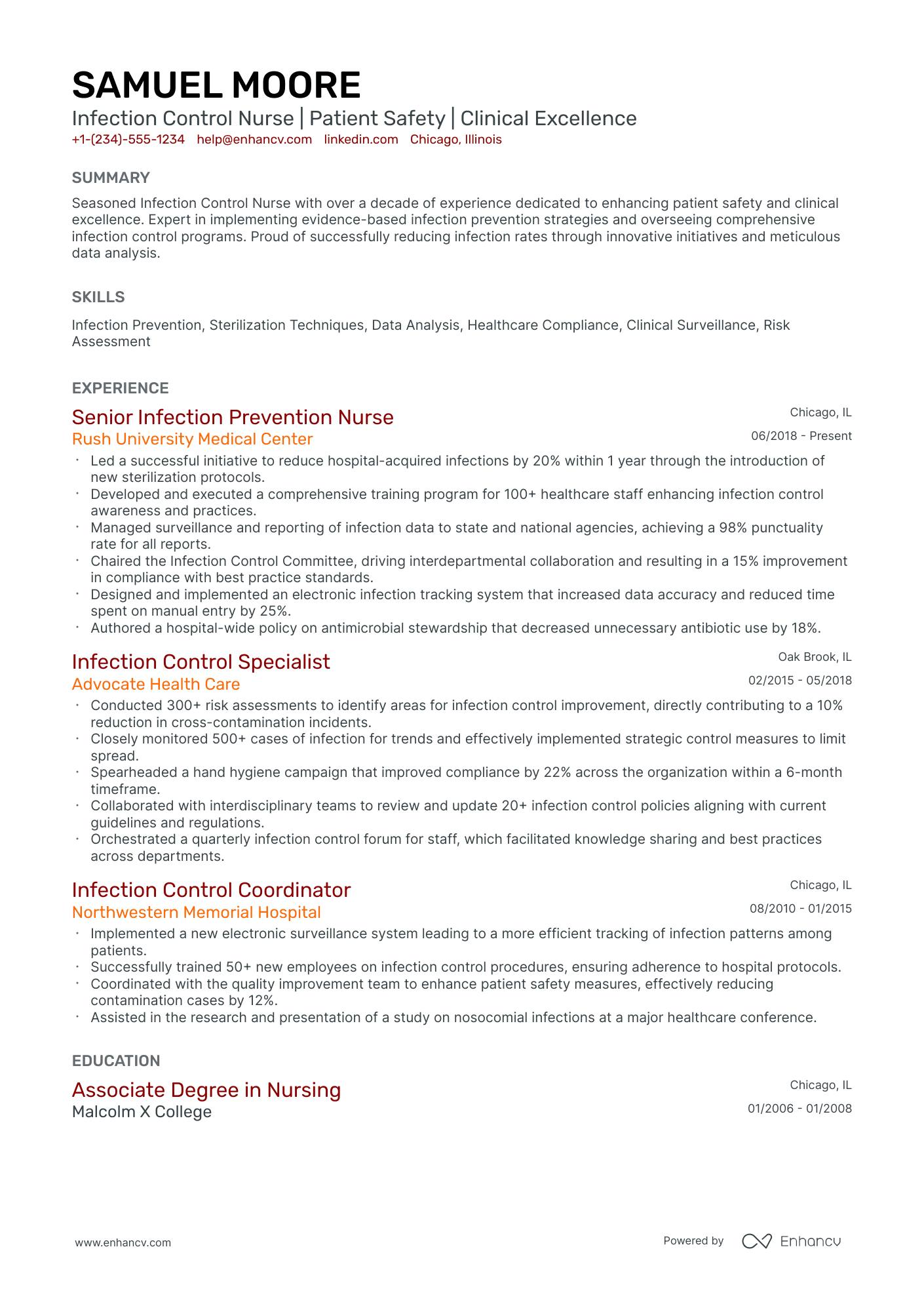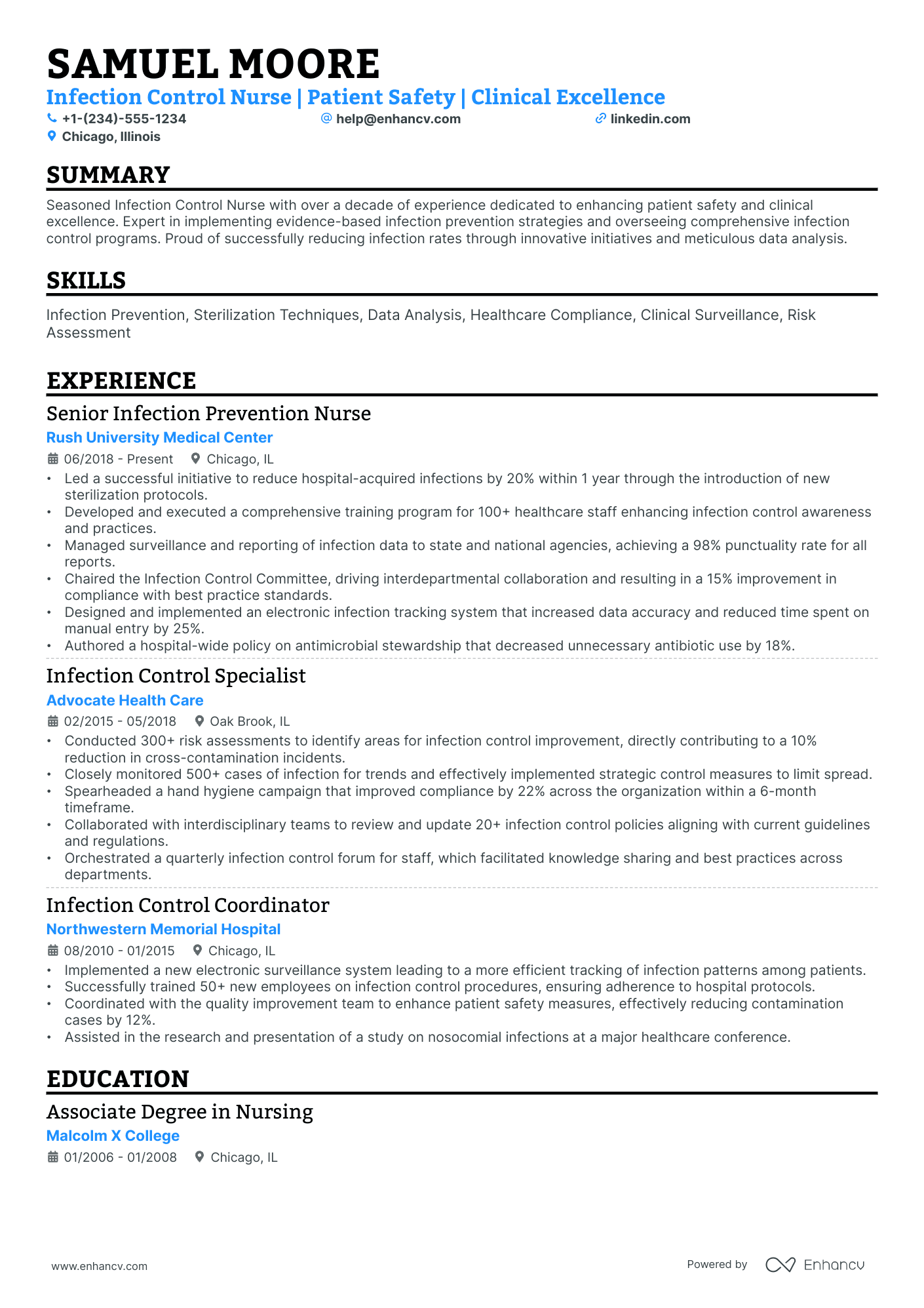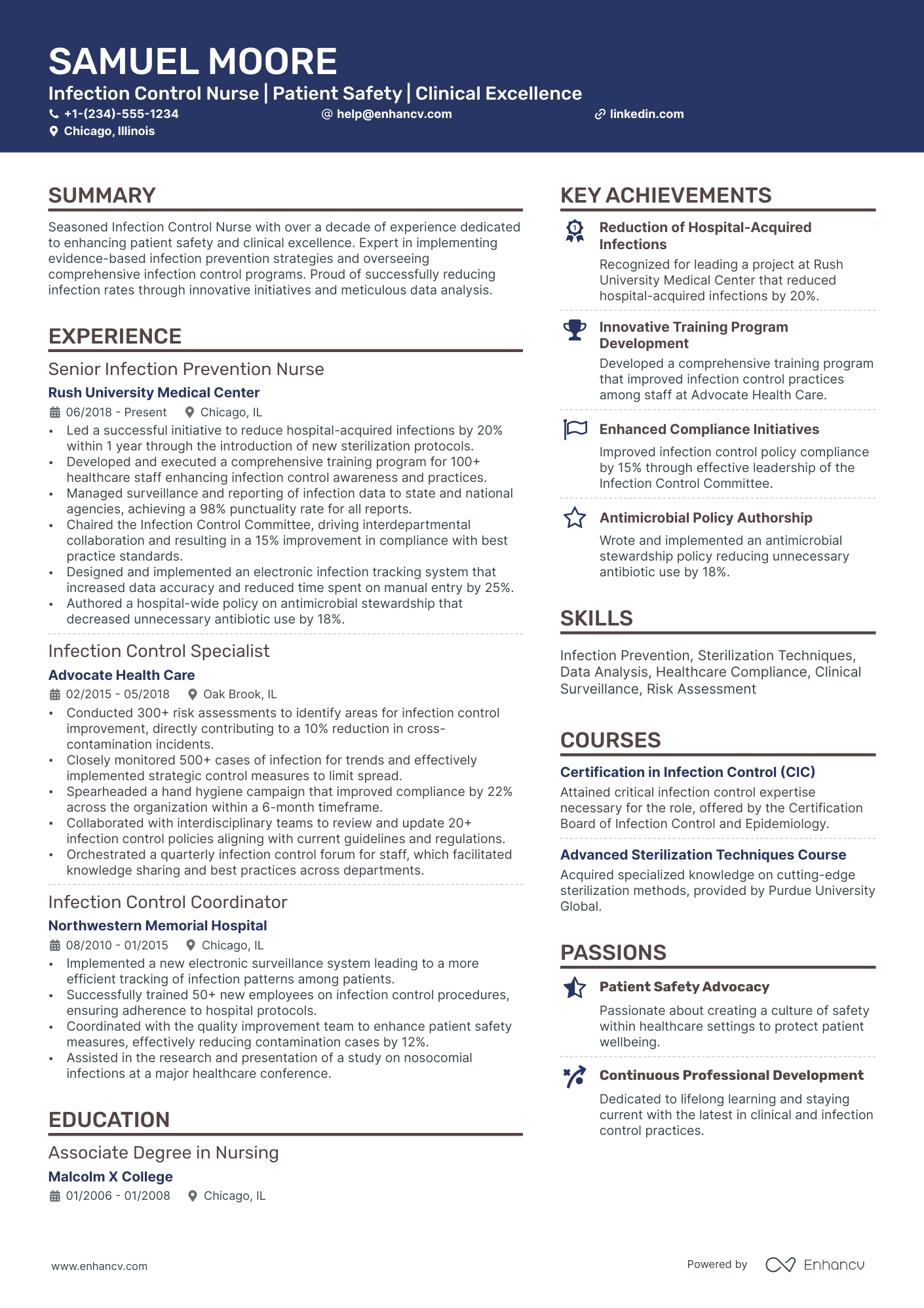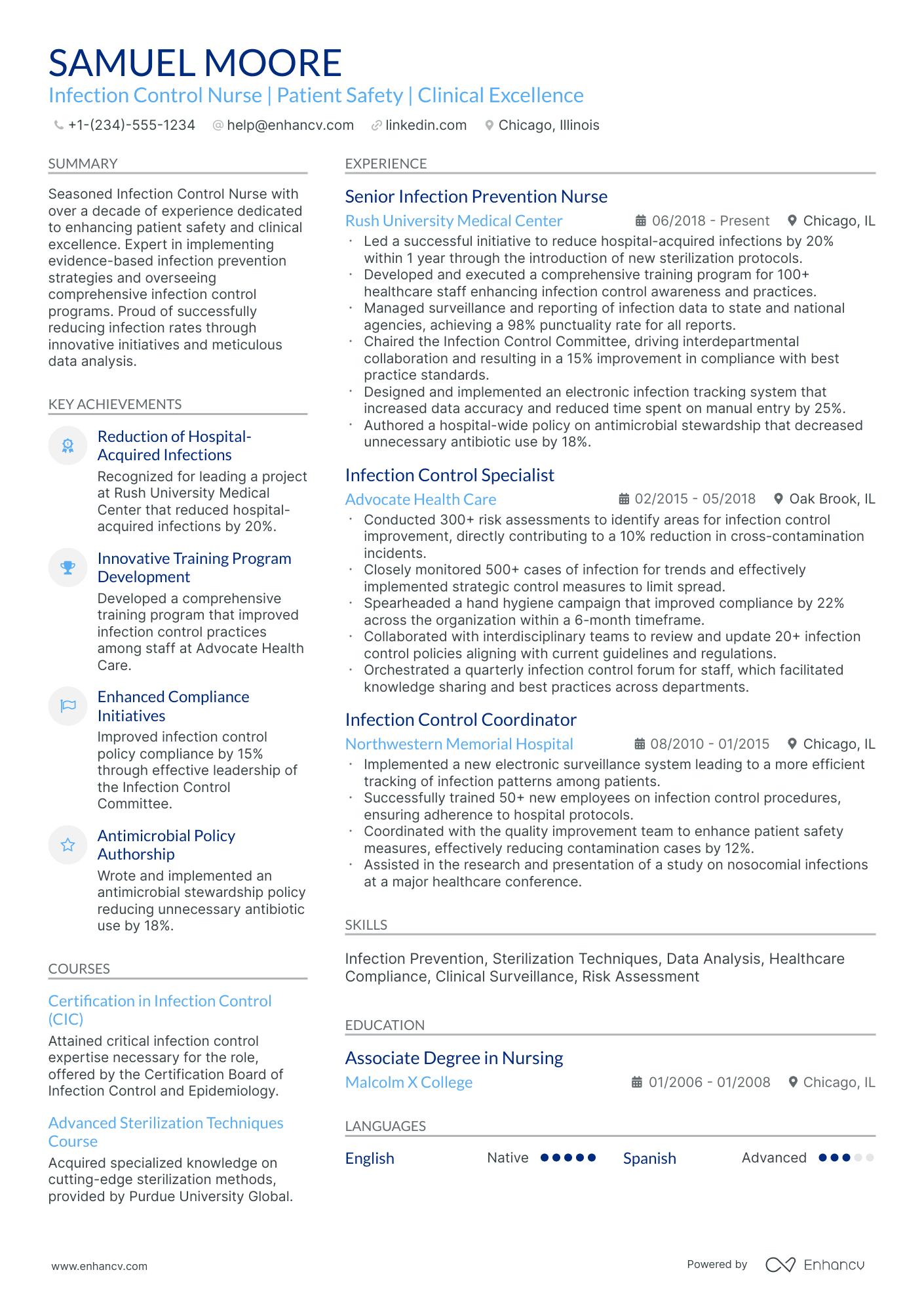As an infection control nurse, articulating the breadth of your expertise in a concise resume can be challenging due to the specialized nature of your work. Our guide provides tailored strategies that will help you highlight your skills and experiences clearly and effectively, ensuring your resume stands out to potential employers.
- Sample industry-leading examples to learn how to write your best resume yet.
- Improve the experience, education, and achievements section of your resume with insights from resume-writing professionals.
- Curate your technical expertise and personality to stand out amongst the pool of candidates.
- Succinctly focus on your unique skill set all through your infection control nurse resume.
If the infection control nurse resume isn't the right one for you, take a look at other related guides we have:
The importance of format and layout in your infection control nurse resume
Consider you're an HR professional at company X, evaluating two infection control nurse candidate resumes. John Smith presents a simple, traditional, and easy-to-read resume. Edward Price, however, uses a non-conventional, often illegible format. Whose resume would you spend more time on to understand their experience? This scenario underscores the importance of your infection control nurse resume’s design. It should be simply formatted and clearly communicate why you are the ideal candidate for the role.
Achieve this balance by:
- Listing your experience, beginning with the most recent and relevant, in reverse chronological order;
- Ensuring your header contains essential information, such as contact details, a headline, and a portfolio link. Include a professional photo in the infection control nurse resume header if you have one;
- Including only the most important and relevant resume sections to showcase your expertise and stand out from other candidates;
- Editing your infection control nurse resume to be no longer than two pages if you have extensive relevant experience. Use your limited resume space judiciously.
Also, remember that your infection control nurse resume might initially be scanned by an Applicant Tracker System (ATS).
When it comes to ATS:
- Opt for simple and legible fonts like Raleway, Rubik, Lato, etc., making your experience easy for the ATS to scan;
- Use serif and sans-serif fonts, both of which are ATS-friendly;
- Avoid overused options like Arial and Times New Roman, which, while suitable, may lack personality.
Contrary to a common myth, our recent study shows that the ATS can effectively process both one-column and two-column resumes. Learn more about this in the ATS myths guide.
Finally, when submitting your infection control nurse resume, always export it as a PDF to ensure all information remains intact, making the document easier to print, read, and scan.
Consider your target market – resumes in Canada, for example, follow different layout conventions.
Upload & Check Your Resume
Drop your resume here or choose a file. PDF & DOCX only. Max 2MB file size.
PRO TIP
If you're in the process of obtaining your certificate or degree, list the expected date you're supposed to graduate or be certified.
Don't forget to include these six sections on your infection control nurse resume:
- Header and summary for your contact details and to highlight your alignment with the infection control nurse job you're applying for
- Experience section to get into specific technologies you're apt at using and personal skills to deliver successful results
- Skills section to further highlight how your profile matches the job requirements
- Education section to provide your academic background
- Achievements to mention any career highlights that may be impressive, or that you might have missed so far in other resume sections
What recruiters want to see on your resume:
- Demonstrated knowledge of infection prevention and control principles, and guidelines such as those from the Centers for Disease Control and Prevention (CDC).
- Experience implementing and auditing infection control protocols and policies within healthcare settings.
- Certification in Infection Control (CIC) indicating specialized expertise in preventing healthcare-associated infections.
- Ability to lead and provide education to healthcare staff on best practices for infection prevention.
- Experience with data analysis and reporting related to infection rates, outbreaks, and effectiveness of infection control measures.
What to include in the experience section of your infection control nurse resume
The resume experience section is perhaps the most important element in your application as it needs to showcase how your current profile matches the job.
While it may take some time to perfect your infection control nurse experience section, here are five tips to keep in mind when writing yours:
- Assess the advert to make a list of key requirements and look back on how each of your past jobs answers those;
- Don't just showcase you know a particular skill, instead, you need proof in the form of tangible results (e.g. numbers, percent, etc.);
- It's perfectly fine to leave off experience items that don't bring anything extra to your skill set or application;
- Recruiters want to understand what the particular value is of working with you, so instead of solely featuring technologies, think about including at least one bullet that's focused on your soft skills;
- Take care with wording each bullet to demonstrate what you've achieved, using a particular skill, and an action verb.
The below infection control nurse resume examples can help guide you to curate your professional experience, following industry-leading tips and advice.
- Spearheaded a hospital-wide hand hygiene improvement program, leading to a 30% reduction in hospital-acquired infections within the first year of implementation.
- Collaborated with a multidisciplinary team to review and revise infection control policies, ensuring compliance with current CDC guidelines and best practices.
- Conducted surveillance of infectious diseases within the facility, identifying trends and executing prompt interventions to mitigate spread.
- Implemented an antibiotic stewardship program that resulted in a 20% decrease in the misuse of broad-spectrum antibiotics.
- Provided training for over 200 healthcare professionals on infection control techniques and PPE usage, achieving consistent adherence across all departments.
- Developed a data-driven approach to track the effectiveness of infection control protocols, leading to more informed and rapid decision-making.
- Led a successful infection control campaign during a regional outbreak of multi-drug resistant organisms, maintaining a below-average transmission rate within the institution.
- Played a key role in obtaining the facility's first Joint Commission certification in infection prevention and control.
- Facilitated cross-departmental communication and reporting on infection incidents, ensuring all stakeholders were informed and equipped to handle potential risks.
- Launched a comprehensive infection risk assessment for the ICU and ER departments, decreasing infection rates by 15%.
- Coordinated the integration of electronic health records into infection monitoring processes, enhancing real-time response capabilities.
- Authored the department's first infection control manual, a reference now used hospital-wide for establishing best practice protocols.
- Collaborated with local health departments on tracking and managing public health concerns, shaping policy based on findings from the field.
- Orchestrated an upgrade to the hospital's isolation rooms, incorporating advanced HEPA filtration systems to better control airborne pathogens.
- Managed reporting and response to bioterrorism threats, ensuring the hospital's preparedness and contributing to community resilience.
- Devised and led a quality improvement project to reduce central line-associated bloodstream infections, successfully cutting rates by 25% over a six-month period.
- Evaluated and upgraded personal protective equipment protocols, which subsequently withstood a rigorous infection control audit by state health officials.
- Initiated a peer-review program within the infection control team to continuously improve clinical practices.
- Piloted a real-time infection tracking system using RFID technology, pinpointing potential outbreaks with a 99% accuracy rate.
- Oversaw the hospital’s response to an influx of patients during a flu epidemic, maintaining a sterile environment and minimizing staff exposure.
- Collaborated with surgical teams to enforce strict pre-op and post-op infection control measures, successfully achieving a record low in surgical site infections.
- Headed an initiative to incorporate infection control considerations into architectural designs for a new wing, resulting in a layout conducive to disease containment and patient safety.
- Directed the adaptation of the WHO's 'Clean Care is Safer Care' program into the hospital practice, markedly boosting patient outcomes and satisfaction scores.
- Implemented a continuous professional development series on emerging infectious diseases, keeping staff at the forefront of infection control knowledge.
The following content includes information from "O*NET OnLine" by the U.S. Department of Labor, Employment and Training Administration (USDOL/ETA). Used under the CC BY 4.0 license. The data represents the top responsibilities present on the task lists for infection control nurse professionals.
Top Responsibilities for Infection Control Nurse:
- Record patients' medical information and vital signs.
- Administer medications to patients and monitor patients for reactions or side effects.
- Maintain accurate, detailed reports and records.
- Monitor, record, and report symptoms or changes in patients' conditions.
- Provide health care, first aid, immunizations, or assistance in convalescence or rehabilitation in locations such as schools, hospitals, or industry.
- Consult and coordinate with healthcare team members to assess, plan, implement, or evaluate patient care plans.
- Direct or supervise less-skilled nursing or healthcare personnel or supervise a particular unit.
- Instruct individuals, families, or other groups on topics such as health education, disease prevention, or childbirth and develop health improvement programs.
- Modify patient treatment plans as indicated by patients' responses and conditions.
- Conduct specified laboratory tests.
Quantifying impact on your resume
- Highlight the reduction in infection rates within the healthcare facility due to interventions you implemented.
- Specify the number of infection control training sessions you have conducted for healthcare staff members.
- Illustrate the percentage decrease in hospital-acquired infections (HAIs) after policy changes you advocated for.
- Detail the number of infection control audits performed and the subsequent improvements made.
- Quantify the cost savings achieved through effective infection control measures and waste reduction.
- State the size of the teams you’ve led or collaborated with on infection control projects.
- Document the number of compliance inspections passed due to adherence to protocols under your guidance.
- Mention any awards or recognitions received for outstanding infection control practices or innovations.
Action verbs for your infection control nurse resume
What if you don't have any experience?
There are two very common scenarios about candidates with less experience. They are either:
- Fresh out of college in search of a infection control nurse role
- Transferring over from a completely different field
Both of these types of candidates still have a shot at landing their first job in the industry.
All they need to do about the experience section of their infection control nurse resume is:
- Consider their strengths - would the outcomes of their previous roles or niche skill sets impress recruiters? Feature those towards the top of your resume
- Exclude any and all irrelevant experience items - remember that at the end of the day, you're telling a story that aims to align with the ideal candidate for the infection control nurse job
- Win recruiters over with personality - perhaps your ambition, dreams, and diligence would make you the perfect fit for the infection control nurse role. Dedicate resume space to detail your personality traits by showcasing how they've helped you succeed in past roles
- Tailor your experience to specific job requirements - ensure your infection control nurse resume answers the advert in the best way possible.
Recommended reads:
PRO TIP
If you happen to have some basic certificates, don't invest too much of your infection control nurse resume real estate in them. Instead, list them within the skills section or as part of your relevant experience. This way you'd ensure you meet all job requirements while dedicating your certificates to only the most in-demand certification across the industry.
Shining a light on your infection control nurse hard skills and soft skills
To win recruiters over, you must really have a breadth of skill set presented and supported within your infection control nurse resume.
On hiring managers' checklists, you'd initially discover hard or technical skills. Those are the technology (and software) that help you perform on the job. Hard skills are easy to quantify via your education, certificates, and on-the-job success.
Another main criterion recruiters are always assessing your infection control nurse resume on is soft skills. That is your ability to communicate, adapt, and grow in new environments. Soft skills are a bit harder to measure, as they are gained both thanks to your personal and professional experience.
Showcase you have the ideal skill set for the role by:
- Dedicating both a skills box (for your technical capabilities) and an achievements or strengths section (to detail your personal skills).
- When listing your skills, be specific about your hard skills (name the precise technology you're able to use) and soft skills (aim to always demonstrate what the outcomes were).
- Avoid listing overused cliches in the skills section (e.g. Microsoft Office and Communication), unless they're otherwise specified as prominent for the role.
- Select up to ten skills which should be defined via various sections in your resume skills sidebar (e.g. a technical skills box, industry expertise box with sliders, strengths section with bullets).
Spice up your resume with leading technical and people skills, that'd help you get noticed by recruiters.
Top skills for your infection control nurse resume:
Infection control protocols
Epidemiology principles
Data analysis software
Healthcare sanitation practices
Sterilization techniques
Surveillance systems
Microbiology knowledge
Regulatory compliance (e.g., OSHA, CDC)
Infection prevention technologies
Quality improvement methods
Communication skills
Critical thinking
Attention to detail
Problem-solving
Empathy
Team collaboration
Leadership abilities
Adaptability
Time management
Conflict resolution
Next, you will find information on the top technologies for infection control nurse professonals from "O*NET OnLine" by the U.S. Department of Labor, Employment and Training Administration (USDOL/ETA). Used under the CC BY 4.0 license.
Top technologies for Infection Control Nurse’s resume:
- eClinicalWorks EHR software
- Henry Schein Dentrix
- Google Docs
- Microsoft Word
- Database software
- Microsoft Access
PRO TIP
Showcase any ongoing or recent educational efforts to stay updated in your field.
The importance of your certifications and education on your infection control nurse resume
Pay attention to the resume education section . It can offer clues about your skills and experiences that align with the job.
- List only tertiary education details, including the institution and dates.
- Mention your expected graduation date if you're currently studying.
- Exclude degrees unrelated to the job or field.
- Describe your education if it allows you to highlight your achievements further.
Your professional qualifications: certificates and education play a crucial role in your infection control nurse application. They showcase your dedication to gaining the best expertise and know-how in the field. Include any diplomas and certificates that are:
- Listed within the job requirements or could make your application stand out
- Niche to your industry and require plenty of effort to obtain
- Helping you prepare for professional growth with forward-facing know-how
- Relevant to the infection control nurse job - make sure to include the name of the certificate, institution you've obtained it at, and dates
Both your certificates and education section need to add further value to your application. That's why we've dedicated this next list just for you - check out some of the most popular infection control nurse certificates to include on your resume:
The top 5 certifications for your infection control nurse resume:
- Certified Infection Control (CIC) - Certification Board of Infection Control and Epidemiology (CBIC)
- Registered Nurse Infection Control (RN-BC) - American Nurses Credentialing Center (ANCC)
- Certification in Infection Prevention and Control (CIC®) - Infection Prevention and Control Canada (IPAC Canada)
- Certified Professional in Healthcare Quality (CPHQ) - National Association for Healthcare Quality (NAHQ)
- Board Certified in Infection Control (BCIC) - American Academy of Infection Control and Epidemiology (AAICE)
The content below includes information from "O*NET OnLine" by the U.S. Department of Labor, Employment and Training Administration (USDOL/ETA). Used under the CC BY 4.0 license. The data represents the top associations for infection control nurse professionals.
Top US associations for a Infection Control Nurse professional
- AFT Nurses and Health Professionals
- American Association of Colleges of Nursing
- American Association of Critical-Care Nurses
- American Nurses Association
- American Society of PeriAnesthesia Nurses
PRO TIP
If you happen to have some basic certificates, don't invest too much of your infection control nurse resume real estate in them. Instead, list them within the skills section or as part of your relevant experience. This way you'd ensure you meet all job requirements while dedicating your certificates to only the most in-demand certification across the industry.
Recommended reads:
Choosing between a infection control nurse resume summary or objective
Many may argue that, in recent times, the infection control nurse resume summary or objective has become completely obsolete.
But the reality is different as both of these resume sections provide you with an opportunity to :
- integrate infection control nurse-vital keywords
- showcase your accomplishments
- answer why you're applying for this particular role.
The difference (between the summary and the objective) is that the:
- Resume objective puts your career goals in a more prominent position.
- Resume summary focuses more on career milestones.
We recommend you select the summary if you happen to have plenty of experience you'd like to spotlight from the very start of your infection control nurse resume.
Meanwhile, the objective is ideal for those candidates who'd like to further prove their suitability for the role with their goals and soft skills.
We've featured some industry professional infection control nurse resume samples to the best resume summary and objective structures:
Resume summaries for a infection control nurse job
- With over 8 years of dedicated experience within high-volume healthcare facilities, a Certified infection control nurse who has achieved a 30% reduction in hospital-acquired infections through the implementation of cutting-edge sterilization protocols and staff training workshops, seeks to leverage in-depth knowledge of epidemiology and disease prevention in managing complex infection control programs.
- Dynamic Infection Control Practitioner with a 10-year background in tertiary healthcare settings, adept at cross-departmental collaboration, leading to the successful design of an infection surveillance system credited with detecting and isolating emergent pathogen outbreaks, resulting in a significant decrease in cross-contamination incidents.
- Eager to apply a 15-year tenure in emergency nursing and a strong foundation in microbiology towards a new challenge in infection prevention and control, bringing proven expertise in rapid response procedures and strong leadership in crisis situations, while continually pursuing professional development opportunities in infectious disease research and control strategy improvements.
- Motivated former Laboratory Technician transitioning into infection control with 5 years of experience in microbiological analysis and quality assurance checks in pharmaceutical manufacturing, aiming to utilize a strong background in sterile techniques and contamination control to assure adherence to the highest infection prevention standards in a patient care setting.
- Passionate entry-level candidate with a Bachelor of Science in Nursing and recently acquired certification in infection control, eager to develop hands-on experience and contribute to targeted infection prevention strategies, with the objective of enhancing patient outcomes and promoting a culture of health and safety within a hospital environment.
- Recent graduate with a Master of Public Health seeking to dive into the specialty of infection control, driven by a commitment to community health and armed with a comprehensive understanding of epidemiological methods and public health education, aims to collaborate in the effective management of infection control protocols and achieve excellence in patient care quality.
Optimize your resume summary and objective for ATS
Drop your resume here or choose a file.
PDF & DOCX only. Max 2MB file size.
Average salary info by state in the US for infection control nurse professionals
Local salary info for Infection Control Nurse.” Source: My Next Move, National Center for O*NET Development. Accessed 10/15/2024
| State | Average Salary (in USD) |
|---|---|
| US National Average | $86,070 |
| California (CA) | $133,990 |
| Texas (TX) | $85,110 |
| Florida (FL) | $80,960 |
| New York (NY) | $104,570 |
| Pennsylvania (PA) | $82,780 |
| Illinois (IL) | $82,470 |
| Ohio (OH) | $79,940 |
| Georgia (GA) | $83,620 |
| North Carolina (NC) | $79,580 |
| Michigan (MI) | $81,710 |
Extra sections to include in your infection control nurse resume
What should you do if you happen to have some space left on your resume, and want to highlight other aspects of your profile that you deem are relevant to the role? Add to your infection control nurse resume some of these personal and professional sections:
- Passions/Interests - to detail how you spend both your personal and professional time, invested in various hobbies;
- Awards - to present those niche accolades that make your experience unique;
- Publications - an excellent choice for professionals, who have just graduated from university or are used to a more academic setting;
- Volunteering - your footprint within your local (or national/international) community.
Key takeaways
- All aspects of your resume should be selected to support your bid for being the perfect candidate for the role;
- Be intentional about listing your skill set to be balanced with both technical and people capabilities, while aligning with the job;
- Include any experience items that are relevant to the role and ensure you feature the outcomes of your responsibilities;
- Use the summary or objective as a screenshot of your best experience highlights;
- Curate various resume sections to showcase personal, transferable skills.
